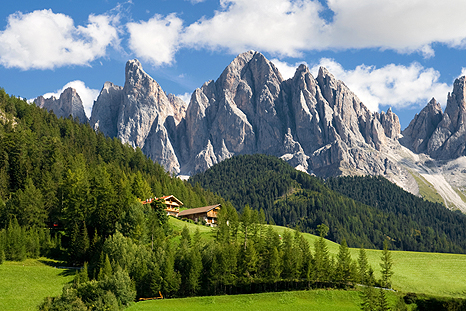A client travelled on our 'The Italian Dolomites' tour and submitted this entry to our writing competition.
Olde-Geisler peaks, Dolomites
The View from the Meadow - Midsummer’s Day
A long lazy afternoon in a flower meadow
High in the Dolomites in the height of summer.
The grasses whisper in the breeze,
The flower heads display their personalities:
Some spread wide and sparkle,
Others nod unobtrusively,
But each summons its pollinator by sight or scent,
Hoping against hope for the thrill
Of the bee's fumbling embrace
As it pursues its hunt for nectar
With such vital unintended consequences.
Which will receive the bee's royal visit
And which will have to fall back again
On vegetative reproduction -
Dull but dutiful, denied
The climactic fulfilling moment
Of the autumn seed explosion it craves?
Butterflies, released by the sun at dawn
From their chrysalis winter
Skitter on the capricious wind,
Pausing only briefly on the nearest
Flower head to take on fuel
Before setting out again,
Restless, driven to find a mate before dusk.
Our meadow is seething beneath
Its picturesque exterior,
For all this is powered by the sun,
Every blade and leaf a trap
To turn each lumen of light to use.
Life goes on untroubled until, until -
The grasses whisper warning -
In one corner of the field
Advances a troop of tramplers,
Not content with carving and gouging out
And concreting over the land,
Leaving only these shrinking refuges,
A tribe of Homo botanicum subalpinum.
Is come to cluster round, exclaim,
To crouch and peer and record,
And above all to Name.
The air chills, the flowers shiver.
A few wear their unwanted names with pride.
Most don't. The bitter milkwort
Winces at its naming,
Scowling at its smug cousin.
What has he done to be called Nice?
A few feet away the melancholy thistle
Sighs apologetically as it pricks you:
This hurts me more than it hurts you
Especially when you tread on me.
Over there, spurned
By the lofty burnet and saxifrage families
With their narrow rules of entry,
Stands the burnet saxifrage,
The perpetual outsider.
Meanwhile the rampant rampion must suppress
Its wild-haired cavalier instincts -
Because these obsessive tramplers
Have called it round-headed,
It must become sober, abstemious, puritanical.
And what gave one of the bellflowers,
The quiet, the good campanulas,
Who ring no constant carillons
As do the cow-belled cattle in the wood,
Never repeating themselves
In their day-long symphony
Of tinkling rumination -
What gives one bellflower the right
To be a fairy’s thimble
When its relatives cluster or creep
Or wear a beard, or be Scheuchz's?
(How do you pronounce CHZ anyway?)
But life's not fair, even for flora.
It forces the shy wolf's bane to come out
At each full moon up in the Transylvanian Hills,
When all it wants is to take the acolyte's cowl
And retire to a monastery
Like its aconite cousin, monk's hood,
And grow monk's rhubarb.
And how is the mouse-eared hawkweed to behave?
Lord it over other weeds
Like its gorgeous orange namesake
Or skulk in shame because
It has the ears of a small rodent?
How would you feel?
Why is she a glowing yellow Archangel
And I just a white dead-nettle?
And being a bladderwort is bad enough,
But lesser bladderwort? Humiliating.
And these people impose names on us
To reflect their own lives and loves -
Loves that lie bleeding in a mist.
They expect us to dress their women
In lady's smocks and lady's mantles,
Lady's slippers on their clumsy feet,
And lay down their ladies tresses on lady's bedstraw
Where Lords and Ladies do what they do -
No vegetative reproduction for them.
They gaze in Venus' Looking glass
To admire their beauty
And stem the march of thyme.
But you learn that the tribe of treaders
Soon moves on, eager to inspect,
Label and photograph
Everything in its path
As driven yet mindless as the ants
Which lay down their urgent scent tracks
Through our meadow, but leave no visible trace.
The long June day draws to a close.
The night-scented flowers come into their own,
A molecule or two adrift on the night air
Is enough to summon their moths as to a candle.
At dusk the meadow takes its ease
And takes its own names back.
The bastard toadflax legitimises itself
The rough saxifrage and hawkbit chamfer their edges,
Ragged Robin spruces up its act,
The poor old squinancy wort is happy whatever it's called.
The burnt-tip, chafing at the upstart vanilla,
Becomes the raspberry ripple orchid.
And the frog orchid becomes once more a Prince.
Read to you on behalf of the meadow by the bristly hawksbeard.
Read more about our 'The Italian Dolomites' holiday.



 Loading search...
Loading search...
